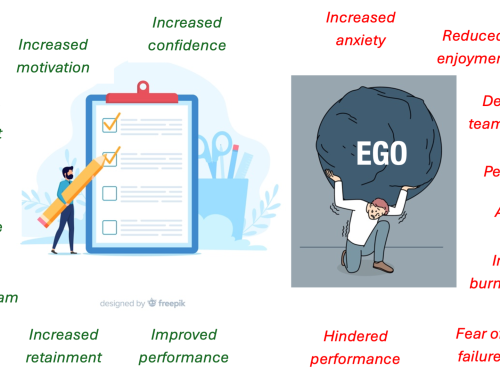Perfectionism.
The tendency to complete a task to such a high level that it appears flawless. It can only be a good thing, right?
Well before we answer this, let’s delve into what perfectionism actually is.
Perfectionism can be thought of as a personality characteristic, typified by the individual’s often obsessive pursuit of exceptionally, and often unachievable, high standards. Alongside this, perfectionists display an overly critical stance on their performance and processes in their control.
Delving even deeper, perfectionism can be split into three types:
- Self-orientated perfectionism – where one strives and expects absolute perfection from yourself
- Other-orientated perfectionism – where one demands perfection from those around you
- Socially-prescribed perfectionism – where one believes that perfection is demanded by those around you
But what is the problem with being a perfectionist?
Well, nothing as such, but it can become one.
Perfectionism is ‘multi-dimensional’. Basically, it can be good (adaptive) but it can be bad (maladaptive).
On one hand, the benefits of being a perfectionist include high levels of performance by setting high-standard goals. Also, motivation is increased to reach these goals, while those who are self-orientated perfectionists strive to be the best performer that they possibly can. For example, Pep Guardiola. Arguably one of the most successful football managers to grace the game, who expects perfection from those around him (other-orientated). In doing so, this results in his teams becoming some of the best in world football.
But on the other hand, a perfectionist’s goals can be hard to achieve and the standard difficult to maintain. As a result of not achieving goals, the individual may experience emotions like anger, frustration and anxiety and their self-esteem may be impacted as they feel their performance is inadequate, often when it is not.
More worryingly, if this occurs over a prolonged period, a performer may experience burnout. This concept describes physical and psychological exhaustion with a reduced sense of accomplishment and interest in the sport diminishes. Research from the University of Leeds has suggested that there is a relationship between perfectionism (particularly socially-prescribed) and athlete – more than likely due to athletes feeling compelled to train excessively.
So, there is seemingly a very fine line between the benefits and negatives of perfectionism that an athlete must be consciously aware of, especially if they recognise as a perfectionist.
Can I manage perfectionism?
Yes!
It can’t be denied that there are positives to perfectionist tendencies, which athletes will undoubtedly want to embrace albeit without the negative side effects. Athletes tend to have high performance goals and set difficult targets that they strive to achieve, and to do so, they put in many hours of practice and training. In turn, one hopes to achieve success. This of course, is all part of sport.
So, when considering the benefits of perfectionist tendencies, you can see why athletes see them as a way to increase performance. The problem comes when these tendencies begin to influence and dictate the athlete’s life. The fear of failure becomes the overarching emotion.
It’s important to note here that we are not trying to eliminate the perfectionism, just manage it, and utilise it productively.
But how?
Let’s split this into four sections: –
- Perfectionist cognitions
- Coping
- Task involvement
- Autonomy-supportive environment
Task Involvement
Essentially this is the motivation we have for participating in the sport. Is your club driven by performance and trophies? And is this what drives you? Socially-prescribed perfectionism is linked with poorer psychological well-being, so it’s important that you are aligned with the club’s direction. Not your motivation? Try immersing yourself in an environment that encourages effort and rewards improvement rather than performance.
Autonomy-supportive Environment
Athletes should aim to compete in an environment which allows choice over different tasks in training. By having an environment in which teammates and coaches value your input, where the rationale behind teaching of certain drills and skills is given, and performance is not over-criticised, athletes are more likely to feel mistakes are acceptable. The coach is a person they can approach for help, along with teammates, and athletes are more likely to flourish. This is known as an autonomy-supportive environment.
Perfectionist Cognitions
Simply, cognitions is broad technical term that refers to an individual’s thoughts and thinking. A perfectionist dwells upon their need to be perfect and how to achieve this. Furthermore, they will recall past events which weren’t ‘perfect’ while thinking to future events and how they can make them perfect. It’s plain to see that this overcritical narrative the athlete’s mind isn’t sustainable. To combat this, the athlete should aim to become aware of the tendencies (by writing a diary, for example) and consciously aim to stop them. This could be through visualising a stop sign, or a verbal cue, such as saying ‘stop’ when these occur. By doing so, your brain begins to recognise these before they occur, in turn making the individual aware and more likely to prevent these. This allows the athlete to focus on strategies for improving performance, not perfecting performance.
Coping
Finally, through learning how to cope with perfectionism can help with the perfectionist tendencies.
Acceptance – whereby you recognise that you have given your all in a performance/training, or accept that you will never deliver the perfect performance is one such strategy.
Rationalising – conscious attempts to add perspective to a recent performance or result which, in turn, will not let the emotions regarding a game/competition/tournament influence your performance. Phrases such as ‘There’s plenty more opportunities to score this season’ may be used for a footballer who feels the need to score in an upcoming match to feel that they have put in a perfect performance.
A mix of these coping mechanisms can really make a difference between a perfectionist hating a sport and a perfectionist enjoying a sport. And just as I mentioned before, we are not here to eliminate perfectionism, but use it to our advantage!
The standards and goals that athletes set themselves defines how we engage with a sport and the level we ultimately reach. It makes sense to want to reach perfection, and the concept of this is understandable but the repercussions of perfectionism can actually mean we stray further from perfection. Management is key, providing balance and success.
So, are you a perfectionist? Which description best describes you? Let me know in the comments, on Instagram @leading.edge.performance or send me a message through the ‘Contact Us’ page!





Leave A Comment